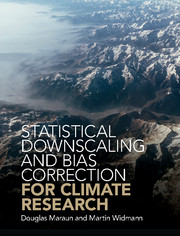Book contents
- Frontmatter
- Dedication
- Contents
- Preface
- Acknowledgements
- 1 Introduction
- Part I Background and Fundamentals
- Part II Statistical Downscaling Concepts and Methods
- Part III Downscaling in Practice and Outlook
- 15 Evaluation
- 16 Performance of Statistical Downscaling
- 17 A Regional Modelling Debate
- 18 Use of Downscaling in Practice
- 19 Outlook
- Appendix A Methods Used in This Book
- Appendix B Useful Resources
- References
- Index
17 - A Regional Modelling Debate
from Part III - Downscaling in Practice and Outlook
Published online by Cambridge University Press: 27 December 2017
- Frontmatter
- Dedication
- Contents
- Preface
- Acknowledgements
- 1 Introduction
- Part I Background and Fundamentals
- Part II Statistical Downscaling Concepts and Methods
- Part III Downscaling in Practice and Outlook
- 15 Evaluation
- 16 Performance of Statistical Downscaling
- 17 A Regional Modelling Debate
- 18 Use of Downscaling in Practice
- 19 Outlook
- Appendix A Methods Used in This Book
- Appendix B Useful Resources
- References
- Index
Summary
Along with the increasing amount of research in climate downscaling, a critical debate about the limitations and suitability of downscaling has arisen. The debate revolves around essentially two questions: first, are climate models skillful to provide userrelevant information about climate change? Some researchers argue that GCMs cannot provide skillful input to downscaling, and downscaling itself cannot add value to GCM simulations. Second, is downscaling necessary, or could it be avoided by bottomup approaches to decision making? We will review these two discussions and critically comment on the issues raised.
Are Climate Models Fit for Purpose?
Kundzewicz and Stakhiv (2010) discuss whether climate models are “ready for prime time” in climate impact research. They argue that GCMs have originally been developed to advise mitigation policies but are more and more applied also to inform adaptation decisions. Whereas for the former purpose, a broad representation of global climate change is sufficient, the latter requires accurate projections of regional changes, in particular of highly uncertain processes such as the hydrological cycle. The authors argue that climate models are not (yet) skillful for direct application in adaptation planning. This view has been shared by other authors (e.g. Pielke and Wilby 2012); it is based on a series of claims (Kundzewicz and Stakhiv 2010, Pielke and Wilby 2012): first, GCMs do not skillfully include all first order forcings and feedbacks; second, GCMs do not skillfully simulate relevant regional processes such as El Niño; third, GCMs do not reproduce observed trends; and fourth, downscaling cannot improve GCM simulations. The first three claims are related to GCM skill, the fourth to downscaling skill and added value. In the following we will discuss these issues.
Skill of GCMs
Pielke et al. (2009) argue that current GCM projections do not consider all first-order forcings that determine future climate, such as the effect of aerosols or changes in land use and land cover. Over recent years, these aspects have more and more been in the focus of climate research and featured prominently in the most recent IPCC assessment report (Boucher et al. 2013, Myhre et al. 2013).
- Type
- Chapter
- Information
- Statistical Downscaling and Bias Correction for Climate Research , pp. 263 - 268Publisher: Cambridge University PressPrint publication year: 2018

